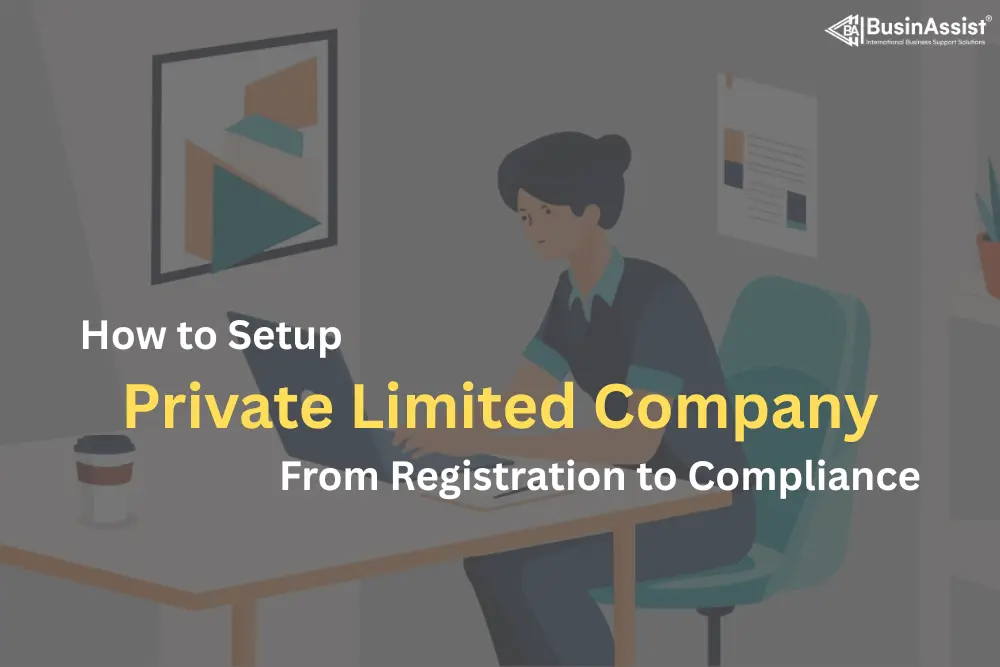Last Updated on November 28, 2025 by Joy Kyalo

When starting a business, most business owners opt for a sole trader, which essentially means operating as a self-employed individual. However, for legal incorporation, most entrepreneurs choose to register a private limited company, which protects business owners from the company’s liability.
The formation of a UK limited company is straightforward; however, business owners need to understand the process and the legal requirements for setting up a private limited company. This article will explore everything you need to know about how to setup a private limited company UK, including the full incorporation process and the benefits it offers.
Key Takeaways
- A private limited company offers limited liability, protecting your personal assets from business debts.
- You must choose a unique company name, registered office address, SIC code, and appoint at least one director.
- Essential documents like the Memorandum and Articles of Association outline how your company will operate
- Registering with Companies House is simple, and services like BusinAssist can help you complete the process smoothly.
Understanding a private limited company
A private limited company is a business structure where the owners of the company are separate from the business. Apart from being distinct from the company owners, it also offers limited liability protection. Here are the key features of a private limited company;
Separate legal identity: A private limited company is separate from the business owners, meaning it can purchase assets, enter into contracts, and even take loans.
Limited liability protection: Business owners are protected from the company’s liabilities. The business owners’ personal assets are protected from the company’s debts.
Ownership: The company is owned by shareholders who may also be the directors of the company.
Control: The business owners retain control of the company since they have the right to decide the number of shares they can sell.
When to start a private limited company?

When you decide to start a business, most business owners choose to start as a sole trader to test the market. This is a good strategy as the business owners do not need to incur a lot of expenses for a business, they are not sure about.
Whether you start a business as a sole trader or directly want to incorporate a private limited company, here is the right time to choose to incorporate.
When you need legal protection for personal assets: A private limited company offers limited protection to business owners, meaning their personal assets are protected from company liabilities.
Appear more credible: A private limited company enhances the credibility of a business with its customers, suppliers, and business partners.
Pro Tip: For New Business Owners
If you want to protect your personal assets and look more credible to clients or investors, incorporate earlier rather than later. Forming a private limited company also makes it easier to secure funding and maintain full control over how your business grows.
Maintain control of the company: Business owners can maintain control of a private limited company since they can choose the number of shares they can sell.
When seeking investment or loans: A private limited company can easily make investments and take loans since it is a legal and formal structure. A formal company structure can make it easier to attract investment.
How to set up a private limited company?

Once you have ensured that this business structure meets your business needs, you can set it up by following these steps;
Choose a company name
In every jurisdiction, there are rules and regulations when it comes to choosing a company name. In the UK, there is no exception. Companies House has a set of rules and restrictions when it comes to the name of the company. These restrictions include:
- The name should be unique
- Not use offensive words
- Not be sensitive or use sensitive words; permission is required.
- Not be misleading or suggest a connection to a government or an international organization
- Private limited companies must add ‘Ltd’ or ‘Limited company’ at the end.
- Certain characters, punctuations, symbols, and signs are not permitted.
- Can only contain a maximum of 180 characters.
Pro Tip: For a Smooth Company Setup
Before registering your company, prepare everything in advance: your company name, SIC code, directors, shareholders, and documents. This saves time and helps you avoid common mistakes that delay incorporation. If you want a hassle-free setup, using a professional service can streamline the entire process.
Registered office address
Every company registered in the UK must have a UK registered office address. You can choose to use your residential address, the address of your place of business, or use a professional business address. It is important to know that a registered office address will be made available in the public register.
So, if you are operating from the comfort of your home, you can use a professional business address to enhance your business’s professional image and credibility. This will ensure that it gives your home privacy by avoiding unsolicited visitors and junk mail.
Choose a SIC code
Every business is classified under a Standard Industrial Code (SIC), which makes it easier for the government agencies to understand the category of the business. The four or five-digit number used to classify businesses based on their primary economic activity.
Appoint at least one director
A private limited company requires at least one director. If you are the sole business owner, you can be the director; however, if you are two or more people starting a company, you can choose who will be a company director.
It is essential to understand that company directors have responsibilities, such as filing statutory records annually, paying corporation tax, and keeping company records. They are also in charge of hiring a company secretary to help with the responsibilities; however, it is not compulsory.
Decide on the company shareholders
The company director can also be a shareholder. However, if there are plenty of people starting a private limited company, one can be the director while others can be the company shareholders.
Shareholders have the power to vote on company matters, make major decisions, and also have more influence in the company.
Create company documents
When incorporating a private limited company, you will need to create the company documents, such as;
- Memorandum of Association: A legal document signed by all shareholders stating that they have agreed to form a company.
- Articles of Association: This is not a legal document required by Companies House, but companies need to have it, as it states the rules on how the company will be operated. The rules are made and agreed upon by shareholders and directors.
Register with Companies House
Once you have all the business documents required, you can incorporate the company with Companies House. You can choose to do that directly or use a third-party service, which can incorporate the company seamlessly.
How to set up a private limited company involves a straightforward process, but business owners must understand the process and requirements needed. This business structure protects business owners’ personal assets due to its limited liability protection.
As a separate legal entity, a private limited company can take loans, purchase assets, and sign contracts, making it easy to get investments and funds when in need. Apart from funds and investments, the structure also enhances the professionalism and credibility of the business.
Whether you want to move from sole trader or directly incorporate a private limited company, BusinAssist ensures the incorporation process is seamless. We handle all communications with Companies House until your company is approved.
To incorporate a UK private limited company, contact us at info@businassist.com.
FAQs
Q: What are the legal requirements to register a private limited company in the UK?
Ans: The legal requirements needed to register a private limited company include: a unique company name, a UK registered office address, a SIC code, a company director, a shareholder, a Memorandum of Association, share capital, and people with significant control (PSCs).
Q: How much does it cost to set up a private limited company in the UK?
Ans: To set up a private limited company directly with Companies House, you will incur £50 to incorporate digitally and £71 by post.
Q: Can a foreign entrepreneur set up a private limited company in the UK?
Ans: Yes, foreign entrepreneurs can set up a private limited company in the UK. For the registered office address, they can rent a virtual office address and use it to register the company to give them a physical presence in the UK.
Q: How long does it take to register a private limited company in the UK?
Ans: Registering a private limited company can take as little as one business day. But it typically takes 1-3 days. Incorporating a private company digitally is way faster than by post.
Q: Do I need a company director and shareholder to set up a private limited company in the UK?
Ans: Yes, a private limited company needs at least one director and shareholder. The company director can also be the shareholder with 100% shares of the company.
Q: Can I convert my existing business into a private limited company in the UK?
Ans: Yes, you can convert your existing business to a private limited company in the UK by registering a new limited company with Companies House. This process requires you to stop being a sole trader (or partnership) and register a new legal entity, rather than converting the old one directly. You will need to register your new company, inform HMRC, and handle the transfer of assets, contracts, and liabilities.
Read Also:
- Company Registration Scotland: Your Complete Guide to Scottish Limited Company Formation
- Company Registration in Northern Ireland: How to Form Your Business the Right Way
- Best Company Formation Agents in the UK 2025: Choose BusinAssist for a Smooth Start
- How to Start a UK Ltd Company from Pakistan: Step-by-Step Guide
- How Much Does It Cost to Set Up a Limited Company UK?
- How Many Bank Holidays in 2026? Full List of UK Dates You Should Know

Joy is a content writer at BusinAssist with 6+ years of experience in content marketing and social media strategy. She specialises in company formation and virtual operations, guiding entrepreneurs through global markets with clarity, drawing on her marketing and PR background. Business Assist with BusinAssist – your business success partner.

